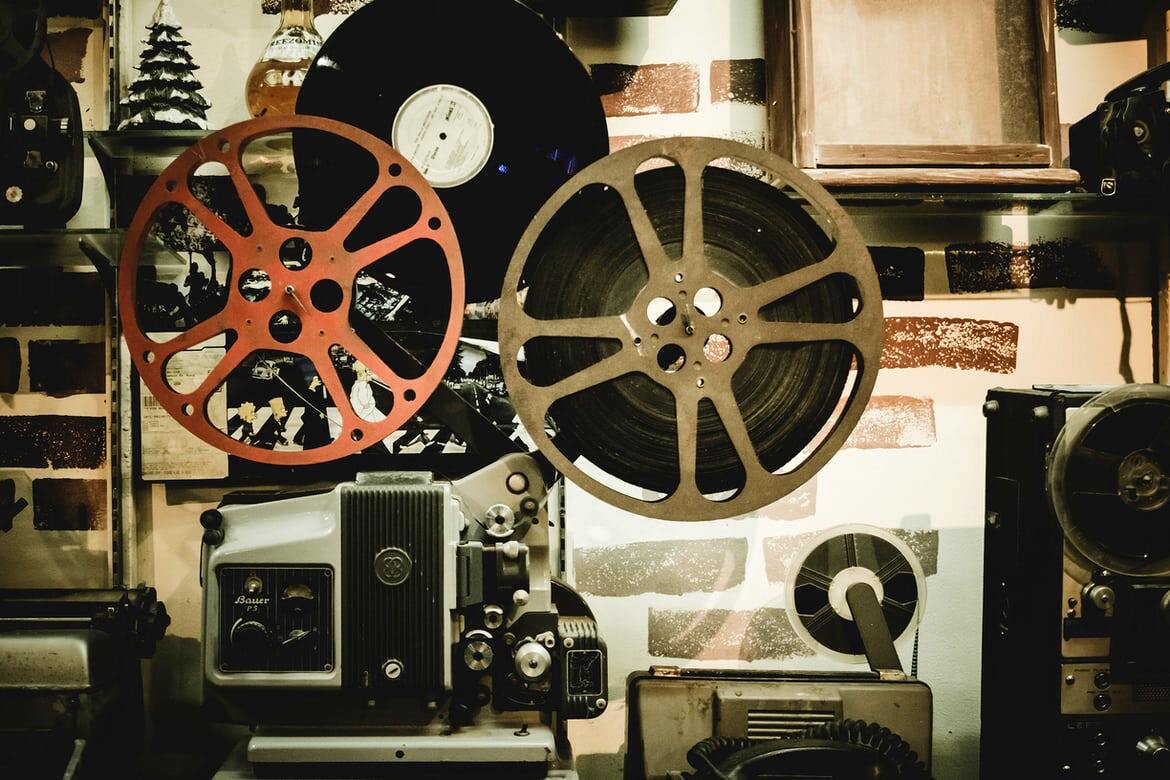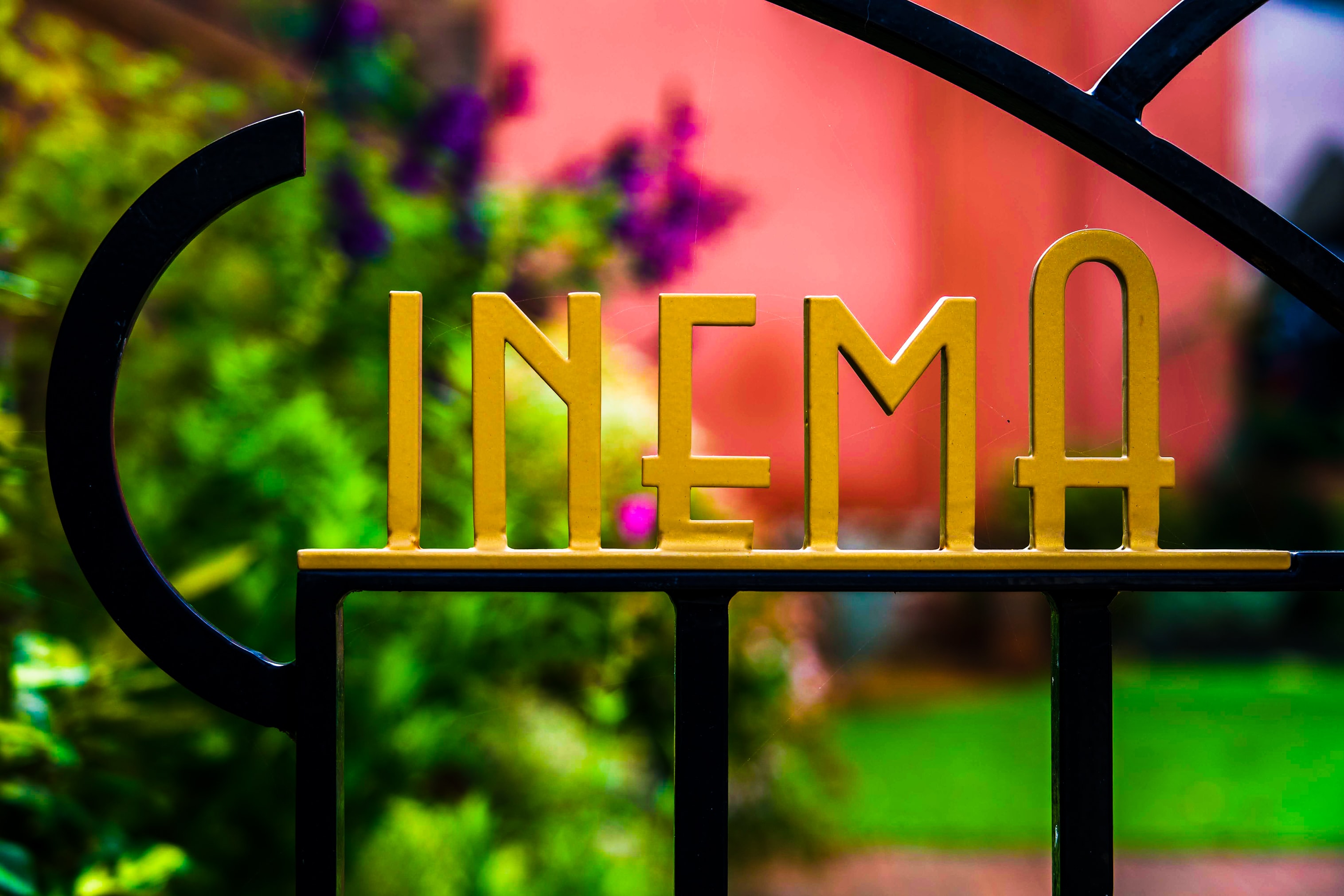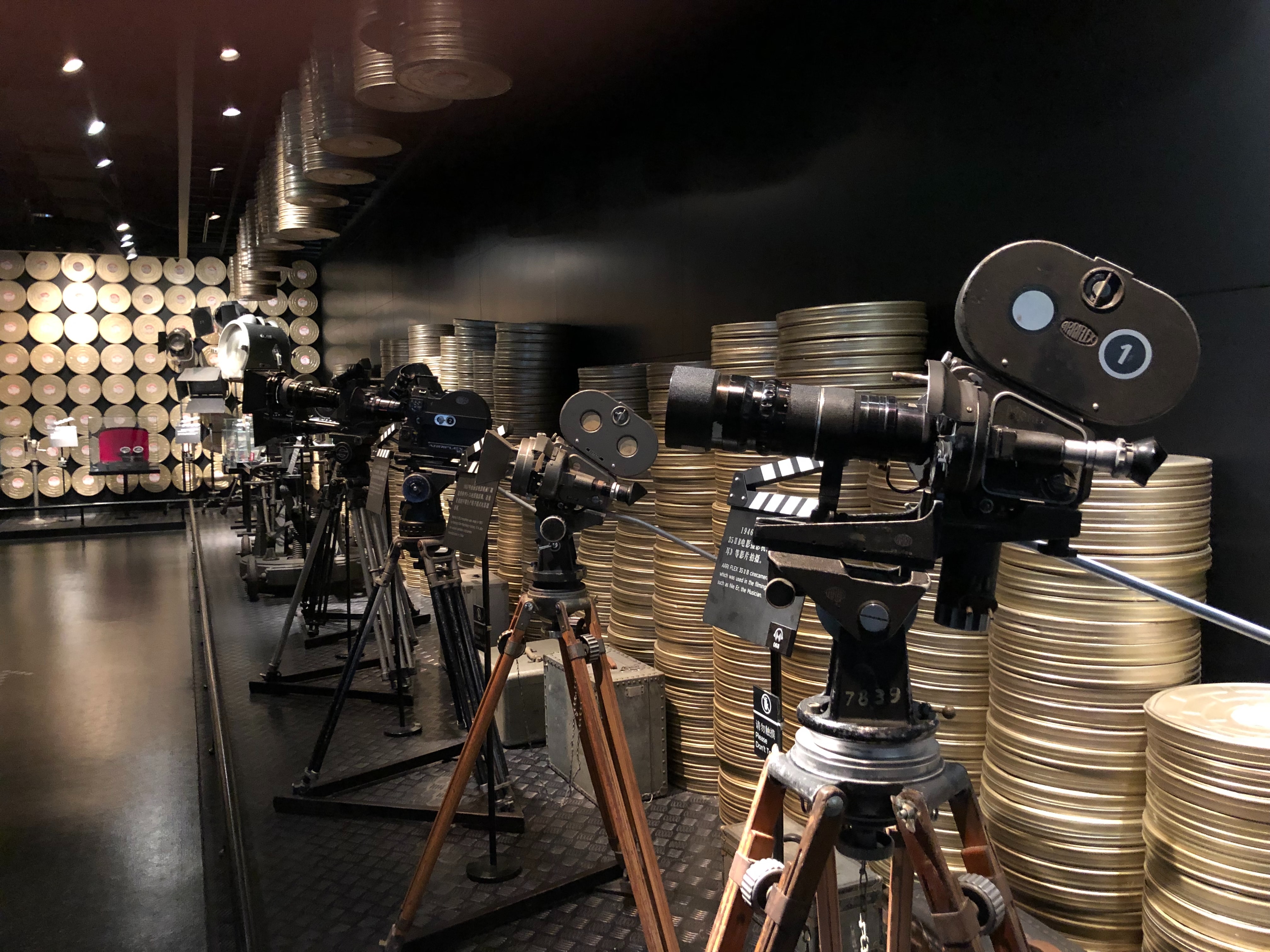The History of Cinema in Israel
For a small country, Israel has not just a thriving film industry but a nation of cinema aficionados. Indeed, even in the era of home streaming and Netflix, you’ll find movie theatres across the country packed out, both for blockbusters and small, independent films. Whether it’s a film by a local director or the latest James Bond, Israelis will be there…and this is reflected in famous Israeli movies competing internationally and winning many awards over the years.

Cinematographer’s room. Photo by Noom Peerapong on Unsplash
In Israel today, the population is just under 9 million people but there are 10 film schools and seven international film festivals held each year! Even though cinema attendance has declined in the last 30 years (well, this is true of almost everywhere in the world today), film directors are still hard at work, producing works that showcase Israel across the world as a vibrant, modern nation, not without its dilemmas but constantly changing.
The History of Cinema in Israel
Before the state was established, there were many cinemas in Israel (see below), initially silent movies. Baruch Agadati established the AGA Newsreel and directed an early film called ‘This is the Land’ in 1935. Also, the children’s author Zvi Lieberman had two of his books turned into films and one of them - ‘Over the Ruins’ - is considered to be a ‘landmark’ in the history of cinema in Israel. After Israel came into being in 1948, different genres of film emerged. These included:
1. Documentary / Propaganda films in Israeli cinema
These were filmed for several purposes - not only were they informative (letting Jews around the world see how the new state of Israel was faring), but they also served as a means of persuasion i.e. encouraging Jews to emigrate, not to mention attracting donations. Two of the most important of these filmmakers were Ya’acov Ben-Dov and Lazar Dunner.
The latter was responsible for the short color film entitled ‘A Day in Degania’, showcasing the first established kibbutz in the country, in the Galilee. In 1953, the Israeli Public Information Administration was established and subsequently produced many propaganda films - they dealt with current affairs, news to do with agriculture and health. These films gave foreigners a glimpse into Israeli Society and were a powerful tool of instruction.
Сinema Sign. Photo by Samuel Regan-Asante on Unsplash
2. ‘Bourekas’ films in Israeli cinema
These ‘comic melodramas’ were popular in the 1960s and ’70s. Often real tearjerkers, they played on ethnic stereotypes of Ashkenazi (European) and Mizrahi (Sephardic-Arab world) Jews and stuck to a predictable format. In general, this would involve a canny, street-smart Mizrahi man trading insults with a conceited, cold, arrogant Ashkenazi man.
Whilst highly popular, with their slapstick humor, they were also criticized for being ‘shallow’ and ‘low brow’. Today, they are no longer made but many have obtained cult status, including ‘Sallah Shabbati’ by Ephraim Kishon, ‘The Contract’ directed by Menachem Golan, and ‘Hagiga B’Snuker’ by Boaz Davidson.
3. ‘New Sensitivity’ films in Israeli cinema
Styled after the new wave French movement, this genre of film was popular in Israel in the 1960s and 1970s. Promoting both artistic and aesthetic values, it was a somewhat modernist style. Films at this time included “The House on Chelouche Street” by Moses Mizrahi, “Hole in the Moon” by Uri Zohar, and “But Where Is Daniel Wax?” by Abraham Zeffer.
A spectator in the cinema. Photo by Karen Zhao on Unsplash
Movie Theatres in Israel - Past to Present
‘Kolnoa Eden’, Tel Aviv - The Eden cinema dates from the turn of the 20th century and was one of the earliest cinemas built in Tel Aviv. It was founded by Moshe Abarbanedl and Mordechai Wieser in 1914, even though residents of the neighborhood (Ahuzat Bayit) objected strongly.
During the First World War, it was closed by the Ottoman government but reopened under the British Mandate and was a true center of social and cultural activity. It even served as a live venue in 1923, when it hosted ‘La Traviata’ performed by the Palestine Opera! It remained popular into the 1950s and 1960s but closed its doors in 1974.
Mograbi Cinema, Tel Aviv - The Kolnoa Mograbi (Mograbi Cinema) was an art deco cinema that opened in 1930, in central Tel Aviv. For years it was, arguably, the city’s most famous cinema and during holidays people often gathered in front of it - indeed, after the 1948 partition and establishment of the State of Israel, it was one of the places where locals broke into spontaneous dancing and cheers of joy. It remained a city landmark for decades afterwards but, following a fire in 1986, it was demolished.
Cafe Lorenz, Tel Aviv - In 1905, Cafe Lorenz opened to the public in Jaffa Road in the neighborhood of Neve Tzedek, with the Lorenzo family screening films there and 20 years later, the Kesem Cinema (‘Magic Cinema’) was housed there for a short period.
Turned on projector. Photo by Jeremy Yap on Unsplash
Esther Cinema, Tel Aviv - Built in 1930, it opened as the ‘Dizengoff Square’ cinema (because of its location but the following year was renamed ‘the Esther Cinema’. Built in the Bauhaus style of architecture (popular in Israel in the 1930s, because of the number of German Jewish architects who had arrived in the city), it was commissioned by Esther and Moses Nathaniel. Very modern for its day, it had seating for 1000 people, air conditioning and a cafe.Soon, it became a social and cultural hub, holding lectures and political meetings too. What makes this building special even today is that it was restored and renovated, made into a boutique hotel called ’Cinema’. Great care was taken to keep the exterior in keeping with the 1930s and inside you can see the original staircase, chandeliers, and a display of projectors and movie posters. It is fair to say that, today, this building is one of the most striking in Tel Aviv.
Alhambra Cinema, Jaffa - Located on Jerusalem Boulevard in Jaffa, and designed in Art Deco style by Elias Al-Mor, this cinema opened in 1937 and was named after the Alhambra Palace in Granada, Spain. Owned by Palestinians, it was used as a cultural institution as well as a cinema, then as a theatre in the 1960s. After being abandoned for a long time, it was restored in 2010 and now is home to the Scientology Centre.
People watching a movie in a movie theatre. Photo by Krists Luhaers on Unsplash
Cinema International, Jerusalem - This silent movie theatre opened in Jerusalem on Jaffa Road in 1912. Housed in Feingold House, it screened silent feature films but with no regular showings - it all depended on how many tickets were sold!Smadar, Cinema Jerusalem - Situated in Jerusalem, in the German Colony, this cinema opened for commercial screenings in 1935 and was soon known as the ‘Orient.’ Jewish management took it over (since originally it had been a German-owned business) and after 1948 it was purchased by four young soldiers, three of whom were later bought out by the fourth, a movie lover called Arye Chechik. It became a real family business - he sold tickets and worked the projector, whilst his wife sold sweets at a nearby stand!
The Armon, Haifa - Moshe Greidinger opened this cinema in 1935 - a building that could seat 1,800 and in art-deco style. Soon it became the hub of Haifa’s entertainment scene, being used not just as a movie theatre but also as a music venue for the Israeli Opera and Israeli Philharmonic.
Clapboard plays an important role in the video production process. Photo by Jakob Owens on Unsplash
Movie Theatres in Israel Today
Today, many of the small, independent cinemas in Israel have closed down, since they cannot compete financially with the big multiplexes, in the form of ‘Cinema City’ and ‘Yes Planet’. However, that does not mean that there is no demand for independent productions - on the contrary, Tel Aviv, Jerusalem, and Haifa are all popular, and not just on a day-to-day basis but for the film festivals they hold.
Cinematheque Tel Aviv
Opened in the spring of 1973, and located within walking distance of the historic part of the city, Tel Aviv Cinematheque and movie archive boasts five screening halls. It shows all kinds of films, both Israeli and international, and hosts a number of festivals. In the fall of 2011, its ‘sister’ the Israeli Cinema Centre opened next door to it. This wing is much larger than the original and boasts three screens, a library, and a restaurant.
Cinematheque Jerusalem
The Jerusalem Cinematheque was opened in 1981, the brainchild of George Ostrovsky, Lia van Leer and the then-mayor of the city, Teddy Kollek. Situated at the Valley of Hinnom (on Hebron Road), it boasts spectacular views of the Old City. With four screening halls and a growing film archive, the Cinematheque is a real treasure for all movie fans.
Screening a mixture of commercial, Israeli, and international films (as well as gems from its archives) it regards itself as a leading platform for the promotion of local cinema. Its Film Archive preserves and showcases films from the beginning of Israeli cinema until modern times and is an exciting venue both for established and up-and-coming film directors.

People at the movie theatre. Photo by Erik Witsoe on Unsplash
Cinematheque Haifa
The Haifa Cinematheque was also established by Lia Van Leer and her husband Wim, but long before its Jerusalem counterpart - actually in the early 1950s. Today it offers visitors the choice of 40 plus films each month, screened in two different theatres. These include old and new films, restored prints, and retrospectives.
Recognized Israeli Film Directors
There have always been classic Israeli films that are loved by its people, but until the last 20 or so years, they didn’t really break onto the world scene. All that has changed now and more and more tales of life in Israel, focusing both on the secular and religious worlds, as well as politics, music, and love, are ending up on the big screen. Ari Folman was nominated for an Oscar in his groundbreaking ‘Waltz with Bashir’, following the story of an Israeli soldier who battles mental health issues after fighting in the first Lebanon war.
Eytan Fox became famous after his film ‘Song of the Siren’ (in 1994) was released, taking a comic look at an Israeli woman’s convoluted love life in the midst of the Gulf War. In 2002, ‘Yossi and Jagger’ was released, a touching portrayal of two men in love, whilst in the midst of their army service. And in 2006, ‘The Bubble’ aired a very personal film for Fox who, openly gay, wanted to deal with the subject of coming out of the closet.
‘Footnote’ by Joseph Cedar, was released in 2001, and later won the ‘Best Screenplay Award’ at Cannes. Exploring the troubled relationship between a father and son who both work at the Hebrew University of Jerusalem, it is both touching and poignant.
Black and silver cameras with film reels. Photo by 昔日少年寻不见 on Unsplash
Cinema Festivals in Israel
Israel holds a number of film festivals each year, which are well-attended. And because of its fascinating history and people, there’s a story to be had on every street corner, which means there are plenty of Israeli directors at the screenings too.
The oldest of these festivals is the one held in Haifa, which began in 1983 and is held every year around Sukkot time (between September and October). Not only are there all kinds of screenings, but each night there is a program of cultural events, which includes outdoor film screenings, live music, and an artists’ market close by.
Hot on the heels of Haifa is the Jerusalem International Film Festival (JIFF) which was first held in 1984. Ever since, each July, it screens between 150 and 200 films, giving both locals and tourists the opportunity to see some of the finest films that have just been made.

A cinema sign, crafted into the ironwork. Photo by Nick Fewings on Unsplash
Nor is Tel Aviv shy in this department, especially when it comes to documentaries. Docaviv, (the Tel Aviv International Documentary Film Festival) was founded in 1998 is the largest festival in Israel, drawing audiences of up to 40,000. And there’s also TLVFest, which focuses on films related to the LGBTQ movement, supporting pluralism in one of the world’s most gay-friendly cities.Moreover, there is the Tel Aviv International Student Film Festival, which promotes young filmmakers, starting out in the industry. Each June it shows more than 200 short films from around the globe and its prizes are highly coveted. Held at the Cinematheque, events include masterclasses, exhibitions, conferences, and artist workshops. Running now since 1996, it has developed a real reputation for innovative cinema.
If you are visiting Israel for one of these film festivals and would like to organize a day tour or private tour within the country, please feel free to contact us by phone or email. We are always happy to help!

Cool looking movie theater popcorn bags. Photo by Corina Rainer on Unsplash
 Login / Register
Login / Register
 Contact Us
Contact Us

 Certificate of Excellence
Certificate of Excellence Guaranteed Departure
Guaranteed Departure Low Prices Guaranteed
Low Prices Guaranteed 24/7 Support
24/7 Support




